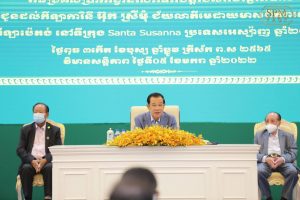Cambodian Prime Minister Hun Sen has apologized for a diplomatic blunder after military leaders in Myanmar failed to release an Australian professor, who was detained four days after the elected government of Aung San Suu Kyi was ousted in a coup on February 1 last year.
Bureaucrats in Phnom Penh had expected Sean Turnell would be freed from prison on Sunday with the official and government-friendly media outlets quick to credit the prime minister’s official visit to Myanmar last month for securing his release on behalf of Australia.
However, junta leader Gen. Aung Min Hlaing spoiled what would have been a much needed victory for Hun Sen as this year’s chair of ASEAN, contradicting a flurry of press releases with assurances that Turnell remained behind bars.
“This morning, I mentioned the release of the detained Australian professor, whom I have requested for the release. Apparently, he has yet been released by Myanmar,” Hun Sen wrote on his Facebook page on Monday evening. “I received wrong information regarding this case and I would like to apologize for the unintentional mistake.”
Government apologies are as rare in Cambodia as they are among the remaining nine leaders within the Association of Southeast Asian Nations (ASEAN) and Hun Sen’s response was at least honest whereas attitudes in Naypyidaw were – as always – indifferent.
Cambodia had staked much on Hun Sen’s controversial trip, which has been criticized by human groups and other members of ASEAN for legitimizing the military’s takeover of a country which had just enjoyed a decade of democracy – out of the last 60 years of military dictatorships.
Gen. Hlaing reveled in his first visit by a foreign leader and Hun Sen was adamant about finding a solution to the bloody violence that has claimed almost 1,500 lives and guiding Myanmar back into the ASEAN fold by moving the Five-Point Consensus forward.
But a troika, bitterly opposed to the junta, has emerged with Indonesia, Malaysia and Brunei; predominantly Muslim countries which remain justifiably incensed over the military’s treatment and alleged genocide of the Rohingya in 2017.
Singapore and the Philippines have shared sympathies and this secured a ban on Myanmar attending ASEAN summits in 2021 when Brunei held the chair of a regional bloc already divided over the South China Sea and wider power-plays between China and the West.
Vietnam and Laos have remained on the sidelines with only Thailand, another military dominated country, offering any kind of mediation. That left Gen. Min Aung Hlaing and his cohorts almost friendless in the regional diplomatic arena.
A legacy conscious Hun Sen, who has declared his intention to stand down next year, sought to address some of these issues as he took the helm of ASEAN and ignored the critics while Gen. Hlaing rolled out the red carpet.
He left Myanmar with an extension to a ceasefire and promises to allow humanitarian aid, open negotiations with all political parties and a review Turnell’s case. He has also extended an invitation to Gen. Hlaing to attend the penultimate ASEAN leaders summit in October.
So impressed was Gen. Hlaing that he apparently sought “god brother” status with Hun Sen, a title also enjoyed by the Sultan of Brunei, Hassanal Bolkiah, and the former Thai prime minister Thaksin Shinawatra.
But barely a month later, the ceasefire is in tatters with the reported massacre of 10 ethnic Chin villagers, prompting more than 1,000 people to flee across the border into India amid reports that airstrikes in Karenni state had displaced about 40,000 civilians.
Myanmar has since been uninvited from next week’s ASEAN Foreign Ministers retreat and Turnell – charged with spying after serving as a senior advisor to Suu Kyi – remains behind bars.
Hun Sen’s apology deserves respect and his attempt to bring Myanmar back into the ASEAN orbit at least laid bare the true apathetic nature of a violent regime that deserves the harshest of sanctions and a seat before an international criminal court as opposed to a place at ASEAN summits.































